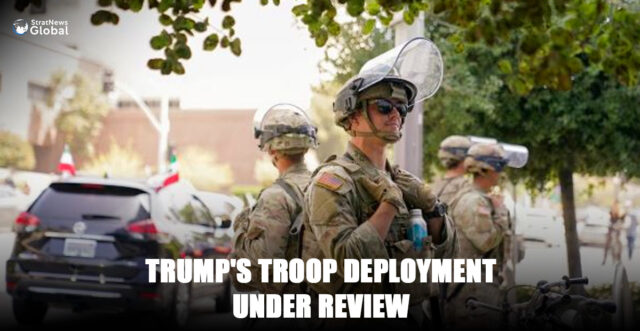During a hearing on Tuesday, judges on a federal appeals court raised concerns over the judiciary’s role in evaluating President Donald Trump’s decision to send National Guard and Marine units to Los Angeles in response to ongoing protests and unrest.
The three-judge panel of the San Francisco-based 9th U.S. Circuit Court of Appeals is considering the Trump administration’s bid to extend a pause it issued last week on U.S. District Judge Charles Breyer’s ruling that the president had called the National Guard into service unlawfully.
The panel members pressed lawyers for the administration and the state of California on whether courts could review Trump’s decision at all.
President’s Judgment
Justice Department lawyer Brett Shumate told the panel that Breyer had “improperly second-guessed the president’s judgment” about the need to call up the National Guard in order to protect federal property and personnel from “mob violence” in Los Angeles.
“There is no role for the court to play in reviewing that decision,” Shumate said.
Trump’s decision to send troops into Los Angeles prompted a national debate about the use of the military on U.S. soil and inflamed political tensions in a city in the midst of protest and turmoil over the president’s immigration raids.
U.S. Circuit Judge Mark Bennett, who was appointed by Trump during his first term, suggested on Tuesday that Breyer’s initial ruling may have gone too far and could improperly prevent a president from exercising his discretion in an emergency situation.
“Even if we were to agree with you that there is some limited role of judicial review, how can that test be met here?” Bennett asked California’s attorney, Samuel Harbourt.
Bennett and U.S. Circuit Judge Jennifer Sung, who was appointed by Democratic former President Joe Biden, separately asked Harbourt to address a U.S. Supreme Court precedent that states “the authority to decide whether the exigency has arisen belongs exclusively to the president.”
Harbourt said the 1827 decision did not apply to the case because it involved different circumstances and it came before Congress passed Section 12406 of Title 10, a law allowing the president to take control of the National Guard to address rebellions or invasions, which Trump cited when deploying the troops.
The 9th Circuit panel, which also included Circuit Judge Eric Miller, a Trump appointee, did not issue a ruling on Tuesday. But Bennett suggested that the appeals court could act before a hearing that Breyer has scheduled in the case for Friday.
Trump’s Deployment Of Troops ‘Unlawful’
Breyer, in San Francisco, had ruled last week that Trump unlawfully took control of California’s National Guard and deployed 4,000 troops to Los Angeles against the wishes of Democratic California Governor Gavin Newsom. Trump also ordered 700 U.S. Marines to the city after sending in the National Guard, but Breyer has not yet ruled on the legality of the Marines’ mobilization.
Breyer said Trump had not complied with requirements of Title 10, and ordered Trump to return control of California’s National Guard to Newsom, who sued over the deployment.
The administration argues that the law gives the president sole discretion to determine whether a “rebellion or danger of a rebellion” requires a military response, and that neither the courts nor a state governor can second-guess that determination.
But, Harbourt said Section 12406 requires both dire circumstances such as a rebellion or invasion to exist, and consultation with a state’s governor – and none of those conditions were met.
Shumate disagreed, saying that Trump alone has the authority to determine whether the National Guard should be called in, and his failure to include Newsom in the decision was at most a “technical violation” of the statute.
“The governor is merely a conduit, not a roadblock or a core executive, when the president decides it’s necessary to call out the Guard,” Shumate said.
Violation Of U.S. Laws
California’s lawsuit, filed on June 9, argues that Trump’s deployment of the National Guard and the Marines violate the state’s sovereignty and U.S. laws that forbid federal troops from participating in civilian law enforcement.
The Trump administration has denied that troops are engaging in law enforcement, saying that they were instead protecting federal buildings and personnel, including U.S. Immigration and Customs Enforcement officers.
Harbourt urged the panel on Tuesday to let Breyer’s ruling go into effect. Further pausing the ruling would “profoundly injure the state of California and our nation more generally.”
“It would allow defendants to further escalate tensions and the risk of violence in the city of Los Angeles,” Harbourt said. “And it would defy our constitutional traditions of preserving state sovereignty, of providing judicial review for the legality of executive action, of safeguarding our cherished rights to political protest and of keeping the military.”
Shumate said that the lower court ruling should be blocked, because it undermined Trump’s authority under the U.S. Constitution over the military and his ability to respond to national emergencies. He said troops were doing important work defending ICE agents.
(With inputs from Reuters)





